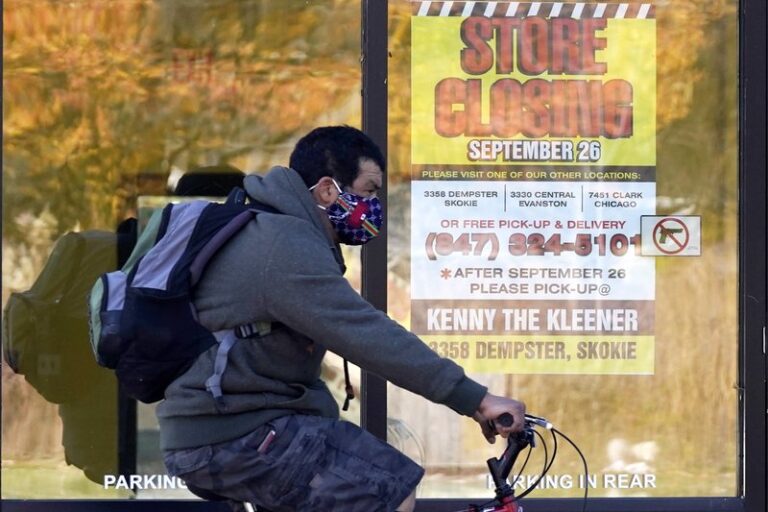
(AP)—With more shutdowns looming and a vaccine months away from wide distribution, governors across the U.S. are pleading for more help from Washington ahead of what is shaping up to be a bleak winter.
Renewed restrictions on indoor businesses, overloaded hospitals and the coming end of unemployment benefits for millions of Americans have led governors to paint a dire picture of the months ahead unless the federal government steps in with more money and leadership to help them shore up their damaged budgets and beat back the resurgence of the coronavirus.
Between now and June 2022, state and local governments could be facing a shortfall of $400 billion or more by some estimates.
On a conference call Tuesday of Democratic governors from the Midwest, Wisconsin Gov. Tony Evers called for a sequel to the Coronavirus Aid, Relief and Economic Security Act adopted by Congress in March.
“There are workers and families and farmers and small businesses that are going to need our help, and frankly, we can’t do it alone,” he said. “We’re going to need a robust federal support system to help our states and economies recover beyond the federal CARES funds that expire at the end of the year.”
Casey Katims, federal liaison for Washington Gov. Jay Inslee, said the situation there is too dire for the state to wait until President-elect Joe Biden is sworn in Jan. 20.
“We need help by the end of this year,” Katims said.
In a news conference Tuesday, Maryland Gov. Larry Hogan, a Republican, made a similar push. “Everyone on both sides of the aisle in Washington needs to come together and finally get this done for the American people,” he said.
And in Colorado on Tuesday, Gov. Jared Polis, a Democrat, called a special legislative session to craft a $220 million state virus-related stimulus measure. “Even as cases have exploded across the country, Congress and the president have not yet passed much needed relief for people. Here in Colorado, we want to do the best with what we have to take care of our own,” he said.
The cost of distributing tens of millions of doses of a vaccine in 2021 is also emerging as a major concern for governors. State health authorities have called on Congress to provide $8.4 billion.
A new infusion of federal money does not appear to be on the way anytime soon. A lame-duck session of Congress and a presidential administration on its way out have chilled the prospects for a deal.
Congressional Democrats and Republicans generally say a new stimulus bill is needed, but they disagree on the scope of it. Some Republicans are opposed to another round of checks directly to most taxpayers, and some don’t want Washington to “bail out” state and local governments that had financial struggles before the pandemic.
On Tuesday, Senate Majority Leader Mitch McConnell said the Democrats’ approach includes “huge sums of money for state and city governments with no linkage to demonstrated COVID needs.”
“Democrats still want coronavirus relief for the entire country held hostage over a massive slush fund for their own use,” the Kentucky Republican said.
The virus is blamed for almost a quarter-million deaths and over 11 million confirmed infections in the U.S.
Last spring, Congress and President Donald Trump agreed to a series of measures worth nearly $3 trillion to deal with the outbreak. The aid included a big boost, since expired, to weekly unemployment benefits, along with grants and loans for businesses and assistance to state and local governments.
States have used the money for testing and contact tracing, assisting businesses, helping residents with utility bills and rent and expanding broadband access for students attending school remotely. But they have not generally been allowed to use it for one of their major needs: replacing declining tax revenue to keep regular government services running.
The needs have become more urgent as the virus rampages across virtually every state. California and Texas each have exceeded 1 million cases.
As intensive care units fill up, some Republican governors once reluctant to impose mask mandates have reversed course, and some cities and states are threatening fines against businesses that violate restrictions on social gatherings.
Biden this week called for Congress to immediately adopt a version of a $2.4 trillion stimulus bill passed by the House, but not the Senate, in May: “This is about keeping Americans afloat.”A vaccine appears to be on the horizon after two companies announced that early trials show their versions are at least 90% effective. But the powerful freezers needed to store the doses, protective equipment for the workers and the task of getting the vaccine into every community and administering the shots are becoming logistical and financial challenges.
The Center on Budget and Policy Priorities estimates that state, local, territorial and tribal government budgets will be short collectively by $275 billion to $415 billion through June 2022 if they use all their reserve money to help deal with the virus. Moody’s Analytics said that for states alone, the shortfall could range from $196 billion to $396 billion, depending on how bad the virus outbreak gets.
Kansas Gov. Laura Kelly, a Democrat, said she is pushing the state’s GOP-dominated congressional delegation for more federal help. She said that Kansas is on course to award federally funded grants totaling $57.5 million to about 3,000 businesses, but that twice as many have applied for help.
Illinois Gov. J.B. Pritzker signed a budget over the summer with a $5 billion deficit, which he and lawmakers assumed would be covered by a second federal coronavirus relief package.
“Every state … every city is suffering from failure of revenues because of COVID-19,” said Pritzker, a Democrat. “The federal government is really the only resource that we all have to turn to.”






